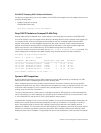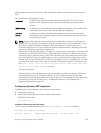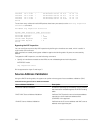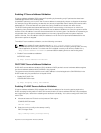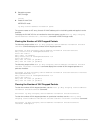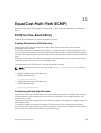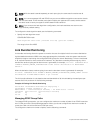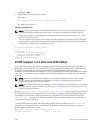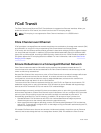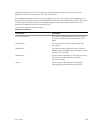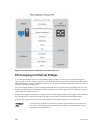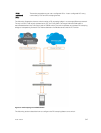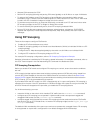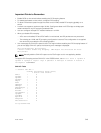
The default is 60%.
• Display details for an ECMP group bundle.
EXEC mode
show link-bundle-distribution ecmp-group ecmp-group-id
The range is from 1 to 64.
Viewing an ECMP Group
NOTE: An ecmp-group index is generated automatically for each unique ecmp-group when you
configure multipath routes to the same network. The system can generate a maximum of 512
unique ecmp-groups. The ecmp-group indices are generated in even numbers (0, 2, 4, 6... 1022)
and are for information only.
You can configure ecmp-group with id 2 for link bundle monitoring. This ecmp-group is different
from the ecmp-group index 2 that is created by configuring routes and is automatically generated.
These two ecmp-groups are not related in any way.
Dell(conf-ecmp-group-5)#show config
!
ecmp-group 5
interface tengigabitethernet 0/2
interface tengigabitethernet 0/3
link-bundle-monitor enable
Dell(conf-ecmp-group-5)#
ECMP Support in L3 Host and LPM Tables
The L3 host and Longest Prefix Match (LPM) tables provide ECMP next-hop forwarding for destination
addresses. You can program IPv6 /128 and IPv4 /32 route prefixes to be stored in the L3 host table and
move IPv6 /128 and IPv4 /32 route prefixes between the host table and the LPM route table.
By default, IPv4 route prefixes are installed only in the LPM table and IPv6/128 route prefixes are installed
only in the L3 host table. In previous releases, the IPv6 /128 entries in the host table were not supported
by ECMP.
NOTE: When moving destination prefixes from the LPM to the host table, there may be a hash
collision because the host table is a hash table. In this case, a workaround does not exist for
programming route entries in the host table.
NOTE: Before moving IPv6/128 route prefixes from the host table to the LPM table, you must enable
LPM CAM partitioning for extended IPv6 prefixes. See Configuring the LPM Table for IPv6 Extended
Prefixes for more information.
Use the ipv4 unicast-host-route or ipv6 unicast-host-route commands to program IPv4 /32
or IPv6 /128 route prefixes to be stored in the L3 host table. A warning message states that the change
takes effect only when IPv4 or IPv6 route prefixes are cleared from the routing table (RTM) using the
clear ip route * command. The IPv6 /128 and IPv4 /32 route-prefix entries that you move to the
host table receive ECMP handling.
To verify ECMP support for IPv6 /128 route prefixes stored in the host table, use the show ipv6 cam
command. The command output includes the ECMP field with IPv6 neighbor addresses. 1 indicates
ECMP handling of destination routes.
Dell# show ipv6 cam linecard 0 port-set 0
Neighbor Mac-Addr Port Vid EC
342
Equal Cost Multi-Path (ECMP)



